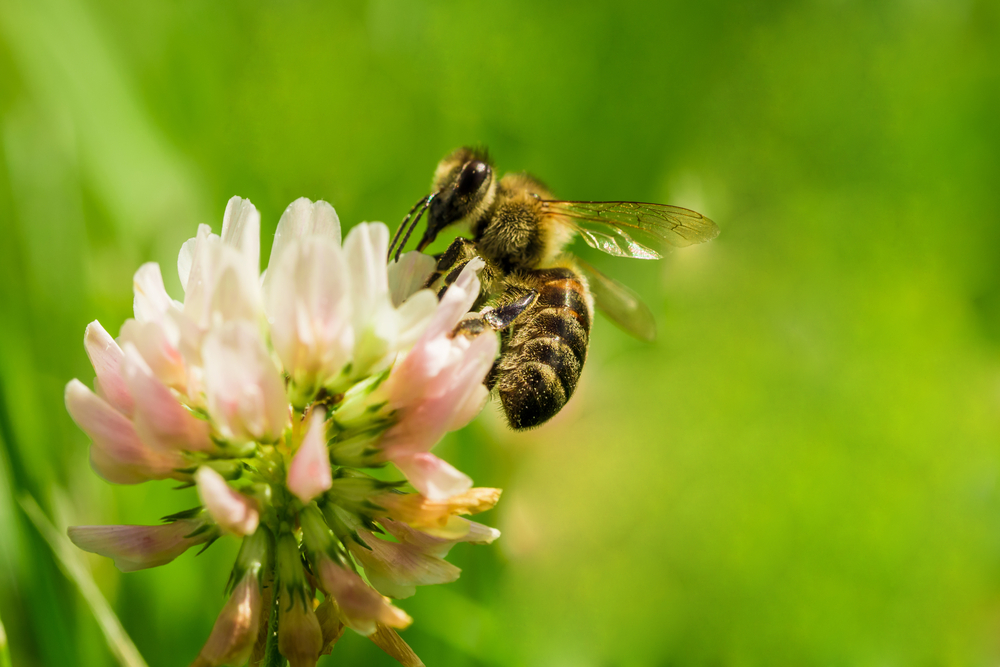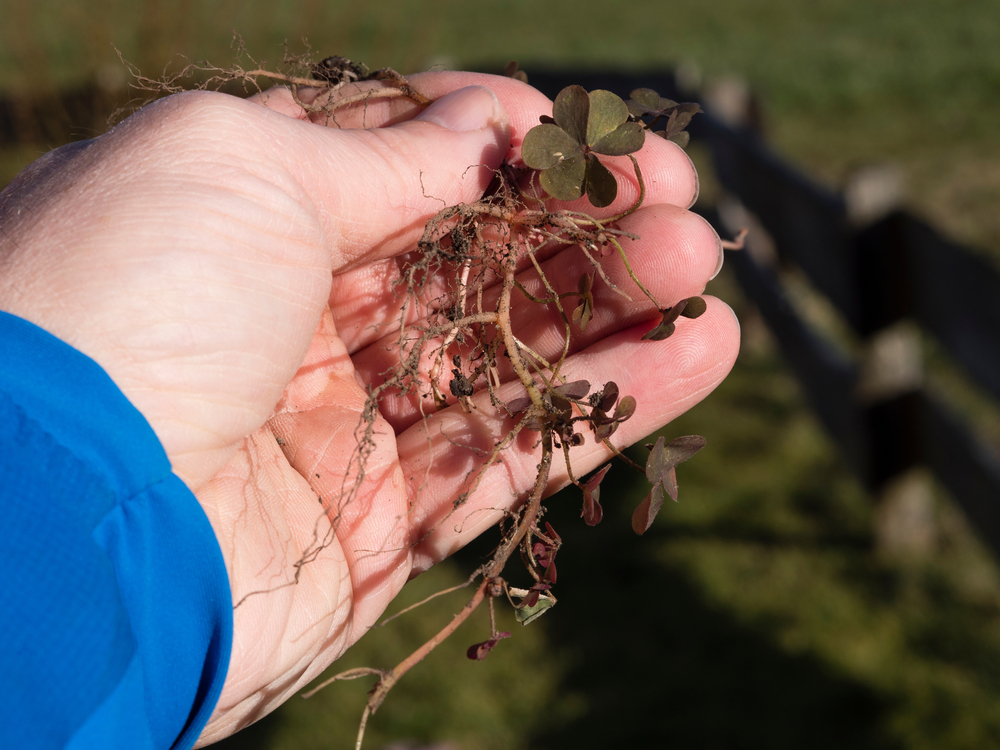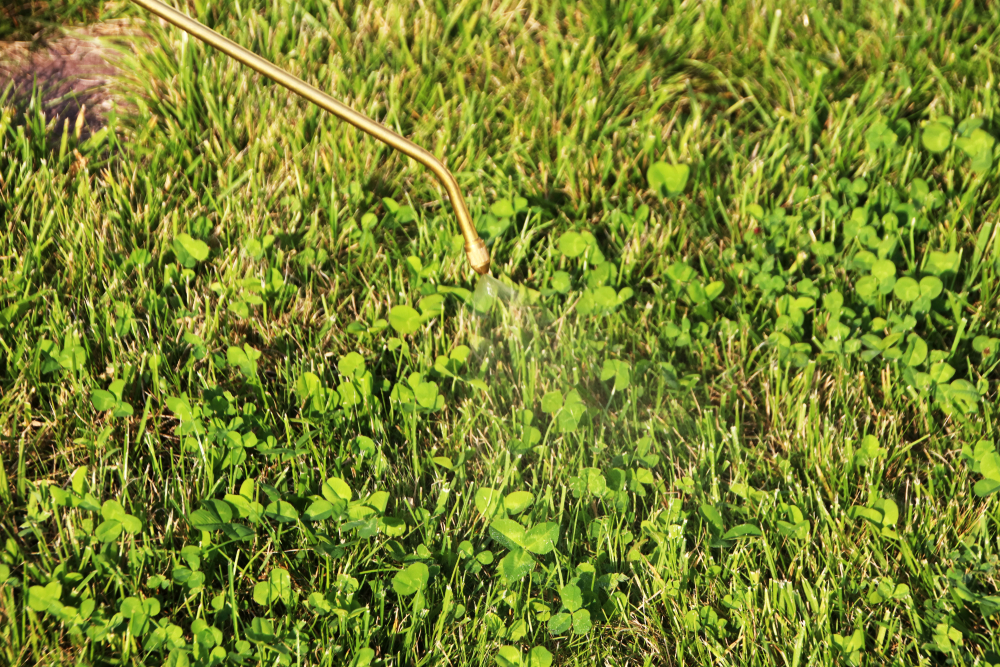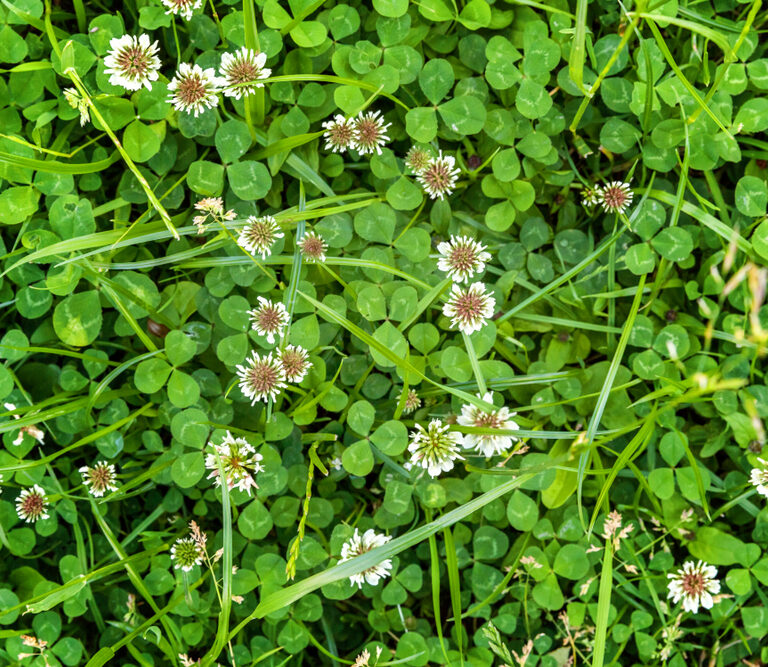Opinions on clover vary, as some homeowners appreciate its appearance, durability, and the nitrogen it produces, while others dislike how its small white flowers look on the lawn.
Another issue with clover is that it’s incredibly stubborn, as once you have it in your yard, getting rid of it is incredibly challenging. It doesn’t seem to matter how many times you mow the lawn; the clover grows back quickly and can eventually overtake the entire yard.
If you find yourself wanting to rid yourself of this weed permanently, you’ll need to figure out how to kill clover. Fortunately, you can use a few methods, both with and without the use of chemicals, that will ensure your grass is the only thing growing in your yard.
What Is Clover?
Trifolium repens, or clover, is a green-colored weed that typically blends in with a yard’s grass. It features white, or sometimes pink, flowers that attract bees and butterflies, creating a mini-ecosystem around your home.
Clover generates nitrogen as it decomposes, which is good for your soil and can encourage your grass to grow by acting as a fertilizer. It also keeps other weeds away by shading the soil’s surface, preventing them from getting a start.
Despite the benefits of clover, some homeowners want it gone for good.
Reasons to Kill Your Clover

In many cases, homeowners will keep a bit of clover around because of its positive attributes.
However, there are a few reasons why you might want to rid your yard of it.
First, there’s the appearance, as many lawn purists like uniform grass without any imperfections. Since clover’s white flowers stand out and its physical appearance differs from grass, these individuals often want to relieve their yard of it.
Clover can also be invasive because it grows quickly, creeping over the entire yard. It tends to thrive in areas without grass cover, so it can become an issue if you’re in the process of regrowing sections of lawn.
There’s also the fact that clover attracts bees, wasps, and hornets. While honeybees are a sign of a healthy ecosystem, they can sting if you aren’t careful. Wasps and hornets, on the other hand, seem like they actively want to sting humans sometimes.
If someone in your family is allergic to stings or you have small children playing in your grass, ridding your lawn of anything that might attract bees and wasps could be a priority.
Luckily, a few methods of killing clover work well if you’re willing to put in the time.
Natural Ways to Kill Clover

Before intervening with chemicals, trying to kill clover through natural means is a good idea because it keeps your soil healthy and won’t endanger the other plants in your yard. Going straight for the nuclear option, like a herbicide, could lead to unintended collateral damage, such as your flowers, garden vegetables, and small trees.
For that reason, it’s best to start with a more gradual method of clearing your yard of clover. While these ideas take a bit of time and work, they’re safer for your vegetation and any animals you have around your home.
Fertilize the Lawn
A lack of nitrogen in your soil creates the ideal environment for clover to grow. Therefore, it makes sense that fertilizing your lawn and keeping its nitrogen levels high can hinder the plant’s growth in your yard.
Using fertilizer also creates healthier grass, which can establish itself in the soil and create a more challenging growth environment for the clover. Use a weed-and-feed formula that is rich in nitrogen for the best results when using this method.
Overheat It
Clover needs light and oxygen to grow, so covering it with a plastic sheet or other unbreathable material works wonders. If you’ve ever accidentally left a tarp on your lawn for a few days, you know how quickly it can kill grass when it gets hot outside. The same goes for clover, as it can’t breathe when it’s covered and will eventually die.
All you have to do is cover the clover and wait a few weeks, as the lack of light and air will kill it for good. Keep in mind that this method will also kill any grass it covers, so put the sheet down strategically and be ready to replant grass in the empty area.
Mow Higher
The shorter your grass, the more opportunity clover has to grow. That’s because short grass gives the clover more access to the sunlight that helps it thrive. Therefore, it stands to reason that having longer grass will block the sunlight as the clover tries to establish itself.
One problem with this solution is that uncut grass looks horrible because it grows at different speeds and makes it look like you aren’t taking care of your lawn. The answer, of course, is to adjust your lawnmower to a higher height.
The good news is that since clover doesn’t grow overly tall, your grass doesn’t have to be excessively high to get the job done. That way, your yard will still look great, and passersby won’t even notice that your grass is a bit longer.
Pull It Out by Hand
It might sound a little ridiculous, but you can pull clover out by hand pretty quickly. Sure, this process will take a lot of effort, but it’s far faster than waiting for nature to take its course.
On the bright side, clover has relatively shallow roots, so it doesn’t take much to remove it. Just grab a handful, and it’ll start coming up pretty quickly.
Wet the soil first, and then pull the weed as soon as you notice it growing. Make sure you get all of the roots, and it shouldn’t come back anytime soon.
While none of these natural clover removal methods are a quick and easy fix, they do work and make it more likely that the rest of your yard stays healthy.
Other Interventions

Eliminating clover from your yard using natural methods might not always be possible. There are cases where its spread is already too great, or you simply don’t have the time to try slower options.
You might not have the patience to wait either, at which time you might look at other clover-killing methods.
When you want faster results, spraying the clover with a weed-killing formula is often your best bet. Keep in mind that you don’t have to use chemicals because some alternatives do a pretty good job, as well.
Soap and Vinegar
A quick weed remedy that gardeners have been using for decades is a mixture of liquid dish soap and vinegar. All you have to do is put the two ingredients in a spray bottle, give it a shake, and spray it on the clover. The mixture should include one cup of vinegar for every drop of dish soap.
Remember that you’ll probably have to keep at it for a few days with this technique because you’re sure to miss some of the clover with your initial effort. However, it doesn’t take long to give your yard a good spray, so you won’t have to spend hours on each pass to get the job done.
While this method might be too tedious for a large patch of clover, it’ll take care of smaller patches in a relatively quick manner.
Corn Gluten
Another time-tested method of removing clover involves spreading corn gluten on your yard. The great thing about this method is that it won’t hurt your grass. That’s because the cornmeal gluten releases dipeptides into the soil that dry out the clover seeds and make it hard for them to sprout.
You’re stopping the clover from reproducing, leaving space for your grass to take its place.
A 20-pound bag of this stuff will kill about 1,000-square-feet of clover, making it an excellent option for large sections of your yard. All you have to do is spread the corn gluten, wet it with water, and allow it to dry naturally.
Broadleaf Herbicide
You might get to the point where you’ve tried everything else, and the clover in your yard just won’t die. When you reach this stage, a broadleaf herbicide might be your only option. The product that you choose will probably contain chemicals like dichlorophenoxyacetic acid, mecoprop, and dicamba.
These chemicals work by twisting the weeds, forcing their leaves to cup and their stems to crack. From there, the plants won’t grow properly and will eventually die.
Keep in mind that while these herbicides won’t hurt your grass, which is why they’re ideal for this use, they could harm other nearby plants. Therefore, it’s a good idea to spot-treat the clover rather than dousing the entire yard in herbicide.
Final Thoughts
You don’t have to kill the clover in your yard. While you might think it ruins your grass’ uniform appearance or spreads too quickly, this plant is actually beneficial to your soil and can help your lawn become healthy and robust.
However, if you’ve made up your mind and want to go ahead with your clover removal, you’ll have a few options at your disposal. The method you choose depends on how much time you have and your aversion to chemicals, so carefully consider your options before deciding how to proceed.
